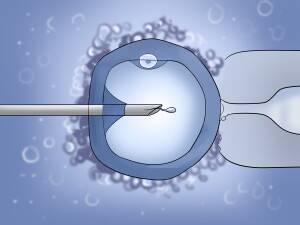 Intracytoplasmic sperm injection (ICSI) is performed as part of your in vitro fertilization (IVF) procedure. It is a process in which a single sperm is injected into the cytoplasm (center) of each egg by an embryologist. After the egg has been injected with sperm, the embryologist will observe the egg over the next day or so. If fertilization occurs and the embryo matures properly, it will be transferred into your uterine cavity.
Intracytoplasmic sperm injection (ICSI) is performed as part of your in vitro fertilization (IVF) procedure. It is a process in which a single sperm is injected into the cytoplasm (center) of each egg by an embryologist. After the egg has been injected with sperm, the embryologist will observe the egg over the next day or so. If fertilization occurs and the embryo matures properly, it will be transferred into your uterine cavity.
Your doctor may recommend ICSI as part of your IVF procedure to treat many causes of infertility, especially when there is a problem with the sperm such as low motility (movement) or low sperm count. ICSI is especially useful in cases where the sperm cannot penetrate the egg or if the sperm are abnormally shaped. ICSI is also used when genetic testing- (comprehensive chromosome screening (CCS) or pre-implantation genetic diagnosis (PGD) – of the embryo(s) is being performed.
How is ICSI performed?
Fertility medication is used to produce multiple eggs in your ovaries during an IVF cycle. Once your follicles (egg sacs) are mature, your eggs will be removed from your ovaries by a doctor. Most patient receive a mild intravenous sedation during this procedure. Meanwhile, your partner will be asked to provide a semen sample, which he will collect by masturbation in the andrology laboratory. The sperm are evaluated and the healthiest sperm are selected for the ICSI procedure.
After the eggs and sperm are collected, the ICSI process takes place in our embryology lab. Your nurse will call the following day to notify you of the fertilization results.
Common FAQ’s about ICSI
How can ICSI help to improve my chances for pregnancy?
A single sperm is selected to be injected into the egg. If the procedure is successful, an embryo transfer will take place 5-6 days later. ICSI is a good option for patients in whom fertilization of the eggs is low or otherwise unlikely.
Is there anything we need to do to prepare for this procedure?
You will need to take fertility medications during the treatment cycle so that your ovaries produce multiple eggs. Also, you should abstain from having sex 2 or 3 days before the egg retrieval to maximize semen quality. Check with your nurse or an andrologist to see if there are any other recommendations specific for you.
How soon will we know if this treatment has been successful?
In general, you will receive a phone call the following day from your nurse with the fertilization results. A pregnancy blood test will be performed about 2 weeks after your embryo transfer.